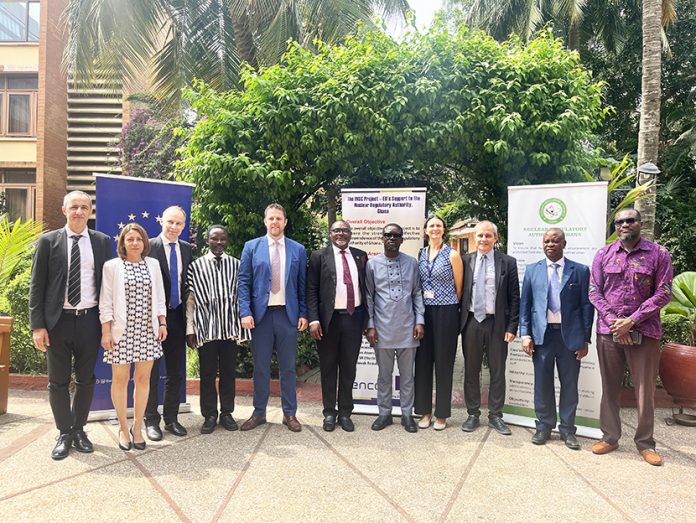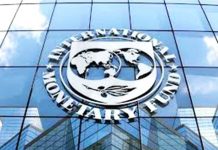Ghana has made a significant stride in its peaceful nuclear power ambitions with the successful completion of a European Union – funded initiative to strengthen the country’s nuclear regulatory framework and safety systems.
The six-year project, titled “Support to the Nuclear Regulatory Authority (NRA) of Ghana” was implemented under the European Instrument for International Nuclear Safety Cooperation (INSC).
Launched in September 2019 with a total funding of €1.75 million, the initiative aimed to enhance the capacity, independence and technical competence of Ghana’s Nuclear Regulatory Authority, as the country prepares to establish its first nuclear power plant.
A high-level closing ceremony in Accra, on Thursday, brought together representatives from Ghana’s Ministry of Environment, Science, Technology and Innovation (MESTI), the European Union Delegation to Ghana and several European nuclear safety institutions.
The event was attended by Mr. Kwamena Essilfie Quaison, Director of Science and Technology at MESTI and Mr. Jonas Claes, Deputy Ambassador of the European Union to Ghana.
EU commends Ghana’s nuclear progress
In his remarks, Mr. Claes praised Ghana’s steady progress and the professionalism demonstrated by the NRA throughout the collaboration.
“This partnership, supported by European expertise and guided by the International Atomic Energy Agency’s recommendations, is helping Ghana to develop its nuclear sector safely and responsibly,” he said.
“Together, we are protecting communities, safeguarding the environment, and setting a standard for the region in safe and sustainable energy development.”
He emphasized that nuclear safety is a global priority that transcends national borders, underscoring the EU’s commitment to supporting countries like Ghana to uphold strong and transparent regulatory systems.
“The EU is fully committed to nuclear safety as a common, non-negotiable objective. History shows that ensuring nuclear safety requires cooperation, competence, and trust. Through this project, we have worked together to promote safety, transparency, and independence within Ghana’s regulatory system,” Mr. Claes added.
Strengthening Ghana’s nuclear regulatory systems
Mr. Quaison, speaking on behalf of the Ministry, outlined the major achievements Ghana has recorded under the INSC project.
These include the approval of the Nuclear and Radiation Safety Policy, which was reviewed through the initiative, and the development of nine new nuclear safety regulations, five of which are currently under review by the Attorney-General’s Department.
The approval of the Safety Policy and the ongoing review of regulations covering site evaluation, licensing, construction and design are clear evidence of the progress achieved through this collaboration,” Mr. Quaison stated.
“The support from our European partners has been invaluable in strengthening the Authority’s operations and enhancing public confidence in the safety of Ghana’s nuclear programme.”
He further revealed that the NRA is finalizing arrangements for an audit of its Integrated Management System under ISO 9001:2015, expected to be completed by the end of the year with EU support.
Knowledge transfer and institutional capacity
Over the six years, the NRA benefited from extensive technical assistance, including training courses, workshops, and on-the-job training in three EU Member States.
These programmes built local expertise in nuclear safety assessment, licensing procedures, radiation protection, and emergency preparedness.
The collaboration also helped Ghana prepare for an Integrated Regulatory Review Service (IRRS) mission of the International Atomic Energy Agency (IAEA), including a nationwide self-assessment of nuclear and radiation safety systems.
In December 2024, the IAEA recognised Ghana’s commitment to continuous improvement in nuclear and radiation safety, commending the NRA for aligning its operations with international best practices.
The project was implemented by a consortium of European Nuclear Regulatory authorities and experts, including the Hungarian Atomic Energy Agency (Hungary), Slovenian Nuclear Safety Administration (Slovenia), Nuclear Regulatory Authority of the Slovak Republic (Slovakia) and ENCO Consulting, a nuclear safety consultancy based in Austria.
These institutions provided mentorship, technical advice, and hands-on training to strengthen Ghana’s institutional readiness for nuclear power development.
For more news, join The Chronicle Newspaper channel on WhatsApp: https://whatsapp.com/channel/0029VbBSs55E50UqNPvSOm2z









